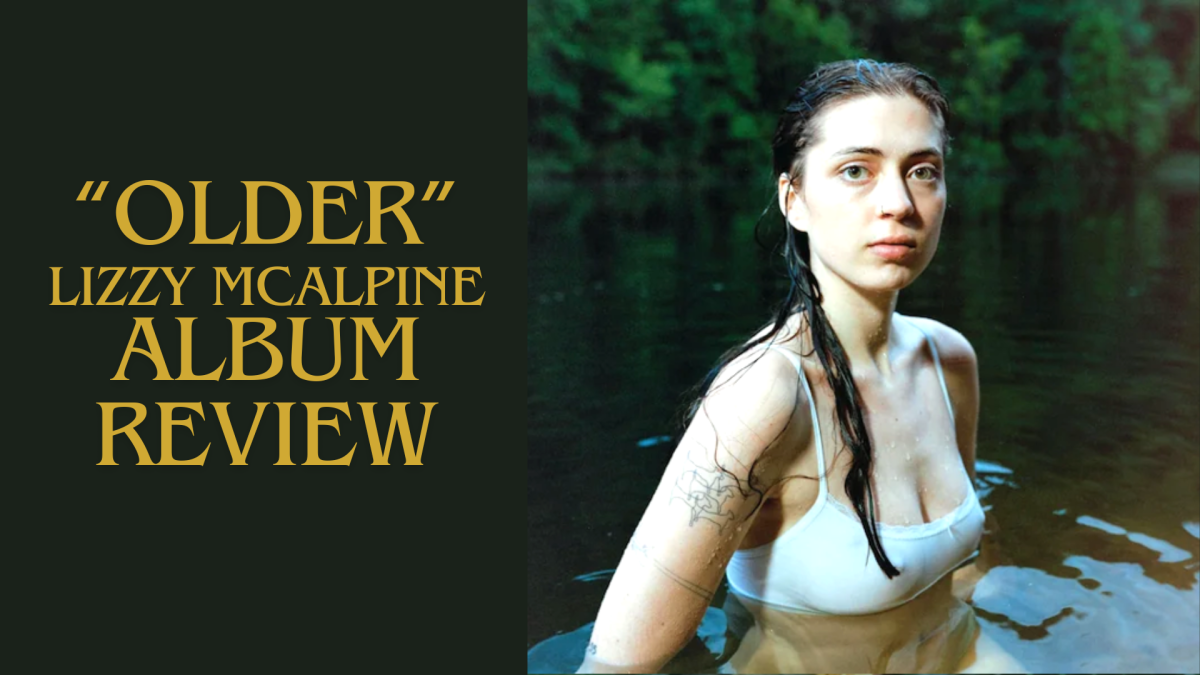Lizzy McAlpine’s success in recent years has reached new heights because of a TikTok trend involving her song “ceilings” involving running and the general theme of romanticizing life. While her genre is primarily indie-pop, elements of folk and alternative peak through the cracks with pedal steel and electric guitar on rare occasions.
“Older” is an album that recounts the trials and tribulations associated with transitions into adulthood. It touches on heavy topics such as toxic relationships, loss of loved ones and self-loathing. While being a very stripped-back album in terms of production, it has a strong emotional core. It feels heavy and shows depth through metaphors and one-sided conversations with herself. It is beautiful through and through and worth the time it takes to listen.
Opening the album is “The Elevator”, a piano-centric track that feels very stripped back and isolated. Nearing the end of the track, it becomes more percussive and more filled out in terms of sound, possibly representative of opening herself up for the rest of the album. Although short, the song feels complete, introducing the first topic of the album: toxic relationships.
The second track on the album is “Come Down Soon”, a song that stood out immediately on first impressions. It is a perfect showcase of McAlpine’s vocal talent, keeping her in her comfortable, almost spoken-word style of singing, but layering it with airy harmonies. McAlpine sings about a good moment with her partner where negative moments are more present than good. She reflects on parallels that her relationship has that move in a similar context to a guy hitting on someone at a bar. She feels anxious, sensing that this might be a routine where she says “There’s something here/ I’m biding time ’til it disappears.” Nearing the end, where she repeats the chorus, “It’ll come down soon,” she sounds like she is calling up to a higher power so that her fears are not confirmed. The guitar and drum offer a steady pace for the other instruments such as the piano and pedal steel to fill out the ebbs and flows of the lyrics.
Track three, “Like It Tends To Do” is a song about realizing the person you once loved is no longer the person you know. With lyrics like “I don’t know where we stand anymore/ We have cordial conversations/ Don’t know why I feel like I’m faking something,” it can be inferred that the interactions are polite but forced and unpleasant. The song is rooted in guitar and pedal steel, again. There is no real percussion but down strumming, which gives the song a heady, airy feel.
“Movie Star” is about feeling like an object to gawk at, but only at surface value by a partner. It is a shorter song, clocking in at just over a minute and a half. I feel like it gets its message out in its entirety. With guitar and piano accenting McAlpine’s voice (and touches of pedal steel), the harmonic aspects of the song are highlighted. The thematic nature of comparing the relationship fundamentals as feeling like a movie star is unique. One thing McAlpine does exceptionally well is metaphors, and this one is no different.
“All Falls Down” is a retrospective of growing up and making adult realizations. It’s a song about feeling drained, but so full of experiences, even when those experiences have started at a young age. The song has the “Hey Ya” by OutKast effect, where the song sounds happy, but when you listen to the lyrics it’s actually devastating. With pop elements of dramatic guitar, fluttering piano, and a catchy beat, the song is set up for success. Even with the strange elements of what sounds like a clarinet and flute, the song feels like a pick me up even though the lyrics are “hollowed out, tell me how to be/ More like you today, more than a shell of me.” It is a mother song that stands out against the track list, but it is because it is faster-paced and a song you can dance to.
My favorite track from this album is “Staying”. While McAlpine’s voice on this album is uniquely airy and ethereal, this song has a fuller sound. With notes of pedal steel and overlayed vocals, this song takes on a different feel for the album. I wish it was longer than the two minutes and thirty-three seconds we got from it. This song has notes of heartbreak and dread. This song is about leaving a relationship that was never fulfilling with lyrics like, “How can you look so peaceful/When you know I’m gonna leave?” And “What happens when you love me dry?”.
“I Guess” is the seventh song on the album and has been charting in the rock category in the United States. It is a song about making sense of a relationship that was with a stranger. McAlpine describes trying to be normal, but genuinely not knowing who the person she was in love with anymore. The act of not knowing is terrifying, so she tries to make sense of her partner’s actions. With guitar strumming leading the tempo of the song, McAlpine’s voice rises and falls. Her signature breathy voice carries the message well. When the keys and drums come in, they almost remain as supports, as they remain mostly unnoticeable. Strings uplift the song, but the final minute of the song is carried by the harmonic layered vocals. The detail of the added horns is perfect as the final dusting of indulgence to the instrumentals.
“Drunk, Running” is a song about coping with an alcoholic partner. It heavily discusses harder topics such as blame and trying to love someone through their battle with substance abuse. It bleeds over a piano. With pedal steel, guitar and faint drumming, leading the listener through the highs and lows of the song, it feels draining by the end of the song. It is a harder song to listen to but is entirely worth it.
“Broken Glass” is the climax of the tension that was building up in the relationship: a bad fight. It is a song about hitting the breaking point where the broken glass is a metaphor for the delicacy of a relationship and how easy it is to shatter it with something as simple as a pebble. This song feels tense the entire time like you’re waiting for the other shoe to drop. The song describes a cycle of violence toward each other through arguments and insults. Playing a blame game, but realizing it ultimately doesn’t matter. Crashing cymbals and heavy drumming show the anger unloading, but strings lead to the feeling of pain in the song. Piano and pedal steel thread the song together, giving a vessel for tension to build as a guitar lilts over McAlpine’s vocals.
“You Forced Me To” is a song about breaking a cycle of mutual destruction. A guitar carries a minor key and clashing notes, to make you feel uneasy. McAlpine discusses changing because of the partner’s wishes and actions. No one is blameless in this relationship she is describing, “I want you to hate me/ I deserve it for my crimes/ I know that I loved you/ But you loved me harder/ Every Time/ I am not the same as when you met me/ I have changed because you forced me to.” It seems never-ending and the instrumentals make it feel like it is dragging on.
The title track of the album, “Older” is a song about stolen youth and has been seen on the US Rock charts since its release. McAlpine reflects on how time has affected her in every aspect of her life. While fixating on her failed relationship with a previous partner, she reflects on the toll of time on those she loves. Lyrics such as “Thought it’d be over by now/ Thought you would leave/ Thought I would come to my senses,” are pieces making up this sentiment of wasting time with someone. Paired with “Wish I was stronger somehow/ Wish it was easy/ Somewhere I lost all my senses/ I wish I knew what the end is,” shows that maybe a definitive end goal may make her give her more purpose, even if that is just to show how fleeting time is. The piano in this song is steady, and unwavering, and a ballad for a time of uncertainty in youth but with growth as the reward at the end even when it feels endless.
“Better Than This” is a song about being self-conscious regarding a new partner because of a past relationship’s transgressions. “What if I’m not a good person?/ You always say that I am/ But you don’t really know me at all now,” shows that there is fear in being vulnerable. Steady guitar and piano feed into this stripped-back vulnerability. It is supposed to be a moment of vulnerability among songs about vulnerability and finding strength. It is a moment of honesty, but being strong in her honesty.
“March” is a song about loss, specifically the loss of McAlpine’s father. Loss has left her feeling helpless. Piano and dreamy steel guitar drive the song’s emotional core. “One year older but somehow I feel younger,” sticks out in this song for me. Her storytelling capabilities in this song shine, especially considering the weight of loss and how it affects every aspect of your life. The repetitive “So far away, and then it hits you,” encapsulates the feeling of loss entirely: the numbness, the helplessness outweighing it, and the eventual breakdown that ensues.
“Vortex” closes out the album as the fourteenth track. It is a song about acknowledging the cycle and admitting that there is healing that still needs to be done. Letting go is the hardest part. She speaks in absolutes and certainty throughout the good and the bad with lyrics like “But it’s always an act/ And it never lasts long.” That level of certainty is the primary field of operation for this song as the absolutes build the tension and drive the tempo. Piano and pedal steel close out the album in instrumentals as a period of reflection on the body of work that is “Older”. The vocal harmonies and piano are hopeful, while the bass line grounds the song throughout crashing cymbals and dreamy strings. There is a hopeful end to the cycle that McAlpine has gone through and it is evident.










